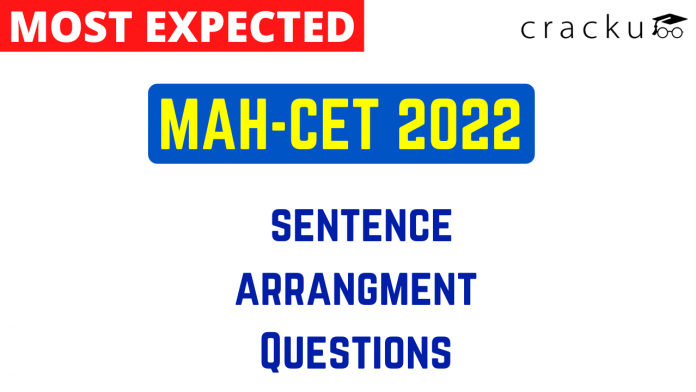Sentence Arrangement Question for MAH-CET [Download PDF]
Here you can download the important MAH – CET Sentence Arrangement Questions PDF by Cracku. Very Important MAH – CET 2022 and These questions will help your MAH – CET preparation. So kindly download the PDF for reference and do more practice.
Download Sentence Arrangement Question for MAH-CET PDF
Enroll to MAH-CET Crash Course
Instructions
Some sentences related to a topic are given in each question. Find the sentence which is out of context of the main theme of the paragraph and rearrange the remaining sentences to make a coherent paragraph. If the given sentence is correct as it is then choose option E. If the sequence is the one which is not given then choose option D as your choice.
Question 1: (A) and burning with resentment against his “oppressors,” (B)/ Beginning with the assumption that the negro (C)/ they attempted to bridge the gap of centuries in a generation. (D) whites who held themselves apart were enemies to the blacks (E)/ was equal or superior to the white in natural endowment
a) BDEC
b) CDEA
c) BEAC
d) None of these
e) No correction required
1) Answer (C)
Solution:
On carefully reading the fragments we see that the sentence is about the negro’s attempt to bridge the gap between the whites. B introduces the context of the sentence and it should be the opening part. E further states what the assumption is. Hence, E should follow B. A further continues what is mentioned in E. Thus, A should come next. C concludes the sentence by mentioning that they tried to bridge the gap of centuries. BEAC forms a coherent sentence. Sentence D is out of context.
Question 2: (A) Magnified into a crime but very little is said on the other side of the question (B)/ the men employed in various capacities by railroads, and (C)/ The commendation of these men takes the form of deeds (D)/ every misdeed is exaggerated, and every indiscretion (E)/ Whenever there is a strike, a great deal is written about.
a) EBDA
b) EBAD
c) DACE
d) None of these
e) No correction required
2) Answer (A)
Solution:
On carefully reading the fragments we see that the subject of the sentence is the men employed in railroads and the attribution during the strikes. E introduces the subject. Hence, it should be the opening part. B should follow E as it explains about ‘whom’. Fragments D and A form a pair as they mention what usually happens and what is excluded. Hence, EBDA forms a coherent sentence. Sentence C which mentions about the deeds will not fit in this sentence. It can come further in the paragraph.
Question 3: (A) Of the glorious climate of California he will hear much at every step, (B)/ when a Spanish novelist, either in fancy or prophecy, (C)/ the State and Lower California as long ago as 1510, (D)/ The name California was given to the territory comprising (E)/ wrote concerning “the great land of California, where an abundance of gold and precious stones are found.”
a) DCBE
b) CAEB
c) AEBC
d) None of these
e) No correction required
3) Answer (A)
Solution:
On carefully reading the fragments we see that the sentence talks about the ‘golden state’ California. Fragment D introduces the subject. Hence, it should be the opening fragment. C should follow D as it mentions what constituted the state. Fragments B and E form a pair as they explain the reason behind California’s name. DCBE forms a coherent sentence. Sentence A is out of context and should be excluded.
Question 4: (A) or to read a single word of the books which the dastardly heretic had written. (B)/ declared Luther an outlaw before God and man, (C)/ and forbade all Germans to give him shelter or food or drink, (D)/ the Reformation was no longer a spiritual and religious affair (E)/ The Diet of Worms, after due deliberation,
a) EBDC
b) EBCA
c) BCED
d) None of these
e) No correction required
4) Answer (B)
Solution:
On carefully reading the fragments we see that Luther is the subject of the sentence. Fragment E introduces the context of the sentence and should be the opening part of the sentence. Sentence B should follow E as it explains what happened in the meeting. Sentence C and A form a pair as they explain the restrictions on Luther. Sentence D which talks about reformation is out of context. Hence, EBCA forms a coherent paragraph.
Question 5: (A) caused by his non-stop consumption of chivalric romance. (B)/ a country gentleman whose limited estate has been eaten away by (C)/ proudly wears the basin that he has claimed from a bewildered barber as Mambrino’s helmet (D)/ The book tells the story of Alonso Quijano, (E)/ the costs to both his purse and mental stability
a) BDEA
b) DBAE
c) DBEC
d) None of these
e) No correction required
5) Answer (D)
Solution:
On carefully reading the fragments, we see that the story of Quijano is the topic of the sentence. Hence, fragment D, which introduces the topic, should be the opening part of the sentence. Sentence B should follow D as it adds information about Quijano. Sentences E and A form a pair as they explain the costs and the causes of them. DBEA forms a coherent sentence. Fragment C is out of context and should be excluded.
Take Free MAH-CET mock tests here
Question 6: (A) And although there is great interest among intellectual historians today in (B)/ No major study has focused on the visual documents integral to this epistemic shift (C)/ Even though the philosophical visualizations of Meurisse, Chéron, and Gaultier had (D)/ challenges to Aristotelian orthodoxies during the “scientific revolution”, (E)/ An international reputation in the early modern period, they have since been largely forgotten,
a) DAEB
b) CAED
c) CBEA
d) None of these
e) No correction required
6) Answer (D)
Solution:
On carefully reading the fragments, we see that the sentence is about the early philosophical tradition. Sentence C introduces the subject of the sentence. Hence, it should be the opening fragment. Sentence E completes the structure of the ‘even though’ part. Hence, it should follow sentence C. Fragment A should follow C as it introduces a new dimension. Sentences D and B form a pair, completing the ‘although…, no major’ part of the sentence. Hence, CEADB forms a coherent sentence.
Question 7: (A) Secured the book as a landmark in the study and representation of demons. (B)/ A monumental compendium of all things diabolical, was first published in 1818 to much success, (C)/ At its heart lies an unlikely but pertinent synthesis of the Enlightenment and the occult (D)/ It is the fabulously illustrated final edition of 1863 which (E)/ Although Jacques Collin de Plancy’s Dictionnaire infernal,
a) DAEC
b) EBDA
c) CBDA
d) None of these
e) No correction required
7) Answer (B)
Solution:
On carefully reading the fragments, we see that Plancy’s infernal is the topic of the sentence. Sentence E introduces the subject. So, it should be the opening fragment. Sentence B should follow E as it further describes the book. Fragments D and A form a pair and complete the structure of the sentence – ‘ Although the first edition was good, it was ….’. Thus, EBDA forms a coherent sentence. C which speaks about the enlightenment and occult is out of context.
Question 8: (A) Not only the wonders of oil as might be expected, but also free-market capitalism (B)/ And made at the behest of the American Petroleum Institute, (C)/ Produced at the height of the Cold War, (D)/ lands in the United States and soon discovers the many and myriad delights of petroleum (E)/ This great little promotional film from John Sutherland Studios champions
a) CDBE
b) BCAE
c) CBEA
d) None of these
e) No correction required
8) Answer (C)
Solution:
On carefully reading the fragments, we see that the topic of the sentence is a video produced in the cold war era. Fragment C introduces the subject. Hence, it should be the opening part. Fragment B should follow C as it adds an extra detail to the previously mentioned statement. Sentences E and A form a pair – ‘champions not only…’. Thus, CBEA forms a coherent sentence. Fragment D which talks about the delights of petroleum is out of context.
Question 9: (A) National School Choice Week provides an opportunity to bring conversations about education (B)/ At its core, school choice affirms the special bond between parents and children (C)/ Parents in communities across America (D)/ Out from the political sphere and to the kitchen tables and living rooms of (E)/ As a nonpartisan awareness effort,
a) EADC
b) EBAC
c) AEBC
d) None of these
e) No correction required
9) Answer (A)
Solution:
On carefully reading the fragments, we see that the sentence is about the National School Choice Week. Fragments E and A form a pair as they introduce the subject of the sentence. Since ‘nonpartisan’ is mentioned in E, D should follow A as it mentions that the discussions are not political. C should follow D as it concludes the sentence – ‘out from political sphere to living rooms of parents..’. EADC forms a coherent sentence. Fragment B is out of context and should be excluded.
Question 10: (A) And students aged 6 to 17 spend at least three hours a day (B)/ For children as young as 10 years old (C)/ According to a recent survey commissioned by HP and conducted by Wakefield Research, (D)/ On devices with Internet access (E)/ computers become a significant part of homework assignments
a) CBED
b) CBAD
c) BCAE
d) None of these
e) No correction required
10) Answer (D)
Solution:
On carefully reading the fragments, we see that the sentence is about the research by HP on the use of computers by the children. C introduces the subject. Hence, it should be the first part of the sentence. Fragments E and B form a pair as they explain the common use of the computers by the children as young as 10. Fragments A and D conclude the sentence. CEBAD forms a coherent sentence.
Instructions
Rearrange the following six sentences (A),(B),(C),(D),(E),and (F) in the proper sequence to form a meaningful paragraph then answer the question given below them.
(A)So the next day when the birds had flown off to lock for food the bird catcher spread his net under the tree.
(B)One day a bird catcher wandering through the forest came upon a banyan tree where a flock of pigeons rested.
(C)But as they were very clever they flapped their wings together lifted the net off the ground and flew away with it.
(D)He knew that if he managed to catch even half the pigeons he would be able to sell them in the market for a very good price.
(E)To their shock they all realized that they had landed right into the net that the bird catcher had set for them
(F)That evening when the pigeons came back they flew down together to the foot of the banyan tree
Question 11: Which of the following should be the FIRST sentence after rearrangement?
a) A
b) B
c) C
d) D
e) E
11) Answer (B)
Solution:
Sentence B is the first sentence as it introduces the subjects- the bird catcher, banyan tree, and pigeons. Sentence D should follow it as the ‘HE’ in it can only be replaced with the bird catcher. Sentence A should follow D as it mentions how woodcutter approached about catching the birds. F follows D because it introduces how pigeons flew down to the foot of banyan tree and as mentioned in E found themselves caught in the net. Sentence C follows E and tells how after being caught in the net, the pigeons lifted the net together. So, the sequence is BDAFEC.
Thus, the first sentence is B.
Question 12: Which of the following should be the THIRD sentence after rearrangement?
a) A
b) B
c) C
d) D
e) E
12) Answer (A)
Solution:
Sentence B is the first sentence as it introduces the subjects- the bird catcher, banyan tree, and pigeons. Sentence D should follow it as the ‘HE’ in it can only be replaced with the bird catcher. Sentence A should follow D as it mentions how woodcutter approached about catching the birds. F follows D because it introduces how pigeons flew down to the foot of banyan tree and as mentioned in E found themselves caught in the net. Sentence C follows E and tells how after being caught in the net, the pigeons lifted the net together. So, the sequence is BDAFEC.
Thus, the third sentence is A.
Question 13: Which of the following should be the SECOND sentence after rearrangement?
a) A
b) B
c) C
d) D
e) F
13) Answer (D)
Solution:
Sentence B is the first sentence as it introduces the subjects- the bird catcher, banyan tree, and pigeons. Sentence D should follow it as the ‘HE’ in it can only be replaced with the bird catcher. Sentence A should follow D as it mentions how woodcutter approached about catching the birds. F follows D because it introduces how pigeons flew down to the foot of banyan tree and as mentioned in E found themselves caught in the net. Sentence C follows E and tells how after being caught in the net, the pigeons lifted the net together. So, the sequence is BDAFEC.
Thus, the second sentence is D.
Question 14: Which of the following should be the FOURTH sentence after rearrangement?
a) B
b) C
c) D
d) E
e) F
14) Answer (E)
Solution:
Sentence B is the first sentence as it introduces the subjects- the bird catcher, banyan tree, and pigeons. Sentence D should follow it as the ‘HE’ in it can only be replaced with the bird catcher. Sentence A should follow D as it mentions how woodcutter approached about catching the birds. F follows D because it introduces how pigeons flew down to the foot of banyan tree and as mentioned in E found themselves caught in the net. Sentence C follows E and tells how after being caught in the net, the pigeons lifted the net together. So, the sequence is BDAFEC.
Thus, the fourth sentence is F.
Question 15: Which of the following should be the LAST(SIXTH) sentence after rearrangement?
a) A
b) B
c) C
d) D
e) E
15) Answer (C)
Solution:
Sentence B is the first sentence as it introduces the subjects- the bird catcher, banyan tree, and pigeons. Sentence D should follow it as the ‘HE’ in it can only be replaced with the bird catcher. Sentence A should follow D as it mentions how woodcutter approached about catching the birds. F follows D because it introduces how pigeons flew down to the foot of banyan tree and as mentioned in E found themselves caught in the net. Sentence C follows E and tells how after being caught in the net, the pigeons lifted the net together. So, the sequence is BDAFEC.
Thus, the last sentence is C.
Instructions
Rearrange the following six sentence (A) (B) (C) (D) (E) and (F) in the proper sequence to form a meaningful paragraph then answer the questions given below them
(A)The woodcutter thankfully broke off from work and sat down to eat the delicious meal that his wife had sent for him
(B)He was in a good mood that particular morning and soon started singing as he swung his axe at the log of wood in front of him
(C)After he had eaten his meal and taken rest for a while the woodcutter got back to work
(D)The hours passed and the sun became hotter than ever and very soon perspiration started breaking out on the woodcutter’s hands and face
(E)One hot summer’s morning a woodcutter was hard at work chopping wood into small pieces so that he could sell them in the market
(F)As it neared afternoon his wife sent their little son to him with food for the afternoon
Question 16: Which of the following be the THIRD sentence after rearrangement ?
a) A
b) B
c) C
d) D
e) E
16) Answer (D)
Solution:
On reading the sentences, it is clear that the paragraph is about routine of woodcutter on a particular day. E should start the para as it introduces the woodcutter. B should follow it because it introduces the particular morning and states what woodcutter did in he morning. D follows it because it suggests that woodcutter continues to cut wood and hours passed. F follows it which should be followed by A. Sentence C comes in last. The sequence is EBDFAC.
Thus, the third sentence is D.
Question 17: Which of the following be the LAST (SIXTH) sentence after rearrangement ?
a) A
b) B
c) C
d) D
e) E
17) Answer (C)
Solution:
On reading the sentences, it is clear that the paragraph is about routine of woodcutter on a particular day. E should start the para as it introduces the woodcutter. B should follow it because it introduces the particular morning and states what woodcutter did in he morning. D follows it because it suggests that woodcutter continues to cut wood and hours passed. F follows it which should be followed by A. Sentence C comes in last. The sequence is EBDFAC.
Thus, the last sentence is C.
Question 18: Which of the following be the SECOND sentence after rearrangement ?
a) A
b) B
c) C
d) D
e) F
18) Answer (B)
Solution:
On reading the sentences, it is clear that the paragraph is about routine of woodcutter on a particular day. E should start the para as it introduces the woodcutter. B should follow it because it introduces the particular morning and states what woodcutter did in he morning. D follows it because it suggests that woodcutter continues to cut wood and hours passed. F follows it which should be followed by A. Sentence C comes in last. The sequence is EBDFAC.
Thus, the second sentence is B.
Question 19: Which of the following be the FIRST sentence after rearrangement ?
a) A
b) B
c) C
d) D
e) E
19) Answer (E)
Solution:
On reading the sentences, it is clear that the paragraph is about routine of woodcutter on a particular day. E should start the para as it introduces the woodcutter. B should follow it because it introduces the particular morning and states what woodcutter did in he morning. D follows it because it suggests that woodcutter continues to cut wood and hours passed. F follows it which should be followed by A. Sentence C comes in last. The sequence is EBDFAC.
Thus, the first sentence is E.
Question 20: Which of the following be the FOURTH sentence after rearrangement ?
a) F
b) E
c) D
d) C
e) B
20) Answer (A)
Solution:
On reading the sentences, it is clear that the paragraph is about routine of woodcutter on a particular day. E should start the para as it introduces the woodcutter. B should follow it because it introduces the particular morning and states what woodcutter did in he morning. D follows it because it suggests that woodcutter continues to cut wood and hours passed. F follows it which should be followed by A. Sentence C comes in last. The sequence is EBDFAC.
Thus, the fourth sentence is F.





